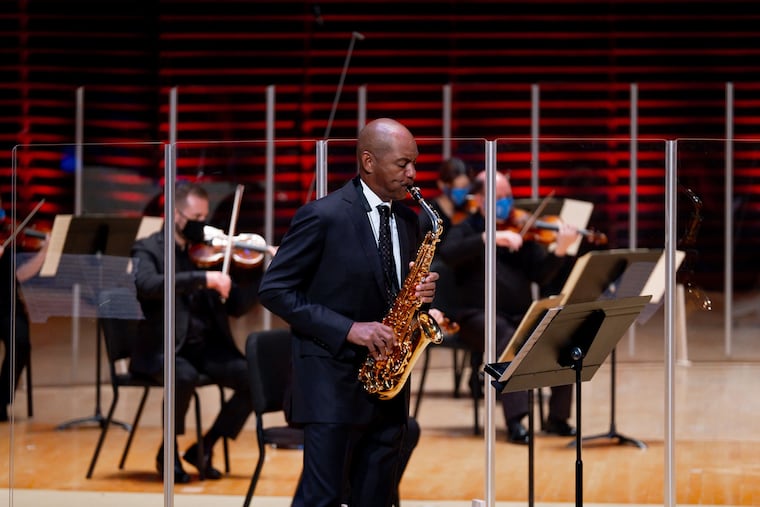Back on stage in Verizon Hall (without an audience), the Philadelphia Orchestra spotlights Branford Marsalis and welcomes a new principal oboist
Conductor Lina Gonzalez-Granados takes the podium for the online concert, available through Sunday. New principal oboist Philippe Tondre makes an impressive debut.

Could the Philadelphia Orchestra have handed Lina Gonzalez-Granados a more challenging program?
Much of the orchestral repertoire is repeated in heavy rotation, so players usually have a familiar starting point when a conductor comes to the podium. This advantage wasn’t available to the orchestra’s conducting fellow in this week’s online production. All three works on the program are oddities of a sort. Dvorak’s Serenade for Winds isn’t even an orchestral work, and knowing where and how to exert influence in it is a tricky thing for a conductor.
The concert that streamed Thursday night and continues to be available through Sunday is the first to be released since the orchestra returned to Verizon Hall. Visually, the production isn’t as lovely as the previous series filmed at the Mann Center featuring skyline drone shots and a pastoral backdrop. Some of the directing and camera work in this new co-production with WHYY comes across as unconnected to anything that’s happening musically.
And, of course, the orchestra still has no live audience. Verizon is lit in red-blue-purple hues, and a new socially distancing stage extension brings the ensemble farther out into the hall. You have to wonder whether acrylic barriers between players contributed to a not-so-tight moment or two.
What’s particularly satisfying about this program is the fairly wide stylistic variety compressed into an hour. Any saxophone concerto is a rarity, and here Branford Marsalis is soloist in not just one but two. Playing with a plastic shield between him and the orchestra, he brings a vocalist’s sensitivity to line and tone in the Glazunov Saxophone Concerto for alto sax and strings (from 1934, here in its first-ever performance by the orchestra). The work’s main melody is an introspective one, and Marsalis shapes it wistfully.
Villa-Lobos' Fantasia for saxophone, strings, and three French horns is soulful, too, but in a different mode. The piece, dating from 1948, has both a sophisticated bounce and a big-city edge, and the writing makes wonderful use of the soprano sax eliding with strings or sometimes soaring into a register that Marsalis flavors bold but never shrill.
Viola often takes the role of the orchestra’s worrying voice, and, opening the second movement, assistant principal violist Kerri Ryan makes known the music’s concerns in resonant tones. The atmosphere then grows ethereal, with Marsalis adroitly floating with a gentle vibrato and smooth runs.
Everyone is a soloist in Dvorak’s Serenade for Winds, with just a dozen instrumentalists. Still, Gonzalez-Granados found smart ways to mold the character of the ensemble, a little frisky here or wonderfully tender there. The performance marks the first appearance of Frenchman Philippe Tondre in the orchestra’s principal oboist chair, and, as we hear him in works of different styles, new impressions will no doubt emerge.
Close followers of the orchestra’s long oboe tradition may hear a player with a more naturalistic and penetrating tone, and how he ultimately blends with an ensemble defined by its homogeneity remains to be seen. His strengths, though, are readily apparent and enormous. Tondre has a way of endowing held notes with a life of their own, and he has a thoughtful and sweet approach to phrasing. It’s also no small thing that in matters of technique he is as solid as they come.
If all of his work here turns out to be like this, he will join a long line of Philadelphia oboists who have managed to keep the secret that, among orchestral players, it is their daily life that is the most treacherous.
This week’s Philadelphia Orchestra “Digital Stage” program is available through Sunday at 11 p.m. at philorch.org. Tickets are $15. The program will also air on WHYY (Channel 12) Sat., Jan. 30, 2021, at 9 p.m.